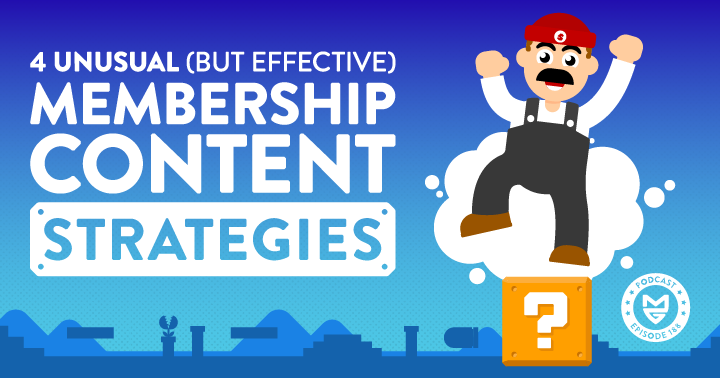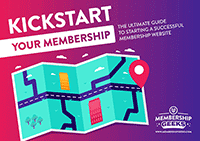How do you take your membership content strategy to the next level?
Or even get it up and running in the first place?
Typically, membership site owners follow two or three fairly common strategies when structuring and distributing their content…
Members are either offered full access to a library…
Or are drip-fed content through things like courses and other resources on a regular basis.
These are both very solid approaches…
But, when it comes to content there are a plethora of creative ways to skin the membership cat…
And if you have to do anything, why not stand out while doing it?
So if you’re in the process of mapping out the specifics of your membership…
Or are looking for ways to spice things up when it comes to your content…
It’s always a great idea to know some of the less common approaches out there…
And we're going to share some of them with you!
Here are four fairly unusual, but pretty effective membership content strategies…
1. The Insider Strategy
In the past, people simply created content for the love it or to build an audience for their business…
But with the rise of platforms like Patreon, and big social media/publishing platforms such as YouTube , Facebook, etc., content creators can now monetize their following…
And it’s on this premise that the insider strategy is built.
Particularly with platforms like YouTube and Patreon, the monetization features are centered on subscriptions, which essentially enables people to create micro memberships built on the back of a passionate fanbase.
With this model you can offer different subscription levels for members to pay to support the content you create…
So they essentially become an insider.

When your fans become insiders…
The prices of the levels themselves vary, depending on the perks included in the package…
These can range from things like member shout outs in content to being featured as a guest…
So, unlike most memberships which generally feature elements like content, coaching and community, this is a whole other ball game.
Essentially insiders receive bonuses for showing support for content.
2. Paid Archive Strategy
While offering content on a platter of gold is as viable a content strategy as ever, there’s still a way to have your cake and eat it…
It’s called the paid archive strategy.
The model involves charging people for access to an archive of material that was originally released as free content.
So, basically, anytime new stuff comes out, it's only free for a limited period of time…
And if people miss that window, the only way to access the content in question is inside the paid membership.
So this approach puts a really interesting spin on the freemium model…
It has an inbuilt degree of urgency, scarcity and fairness…
Because essentially you can, in theory, consume all of the content for free…
It's all really down to timeliness.
And that's an amazing value proposition, right?
Even more, it’s an interesting alternative to having a free membership level, or offering a trial.
You're essentially still getting that risk reversal that comes from being able to allow people to consume your content without making a financial commitment…
But, this time it comes with the added hook that your product offering will go away and the only way to get it again would be to subscribe.
3. Magazine Strategy
If you’ve ever bought a magazine or a subscription to one, then you already have a vague idea of what this model entails.
Typically, when you buy a magazine subscription, you only receive issues released from the date you subscribed…
Well, that’s what the magazine strategy is all about…
You don’t get any of the older materials seeing as you weren’t a paying member at the time of their release.
What if you want to access content that existed prior to your subscription date?
That’s where the money-making angle of the magazine strategy comes into play…
You can sell access to your older content…
The bottom line here is that if anyone wants access to any content released before their subscription date, they can buy them on an individual basis.
Alternatively, you could have two levels of membership…
One following the magazine strategy and the other offering access to new material as well as any material in your archive.
4. Credit Store Model
Upfront, it’s good to know that this model doesn’t offer a one-size-fits-all approach…
But, while it’s quite tricky in that way, it’s as efficient as they come when applied the right way.
The idea here is that your members are allocated tokens or credit that is effectively currency that they can use to purchase content and features within your membership.
More specifically, subscribers are given a monthly stipend of credit which is sometimes based on different subscription options or levels…
So basically, the more they pay, the more content they can access within their membership…
And in some cases, there’s also the option to purchase add-on credits.

Your members…
Whether the credits can be accumulated or need to be spent within the month is totally up to you – the world is your oyster.
It’s worth noting though that this model is not suited to all membership types…
If your website has the potential to produce hundreds or thousands of short episodes or lessons, then this approach could be the right one for you.
In a world full of mundane content strategies…
Picking one of these unusual but effective choices may very well be the thing that helps you stand out from your competition…
Whether you’re just getting started your membership…
Or you’ve covered some ground and are looking for new ways to deliver your content…
Any of the four strategies mentioned above could go a long way in helping you to keep your existing membership engaged…
And even sell more memberships!
Thank You For Listening
We really appreciate you chosing to listen to us and for supporting the Membership Geeks podcast! If you enjoyed today's show, please share it using the social media buttons on this page.
We would also be eternally grateful if you would consider taking a minute or two to leave an honest review and rating for the show. They're extremely helpful when it comes to reaching our audience and we read each and every one personally!
Finally, don't forget to subscribe to the podcast to make sure that you never miss an episode





